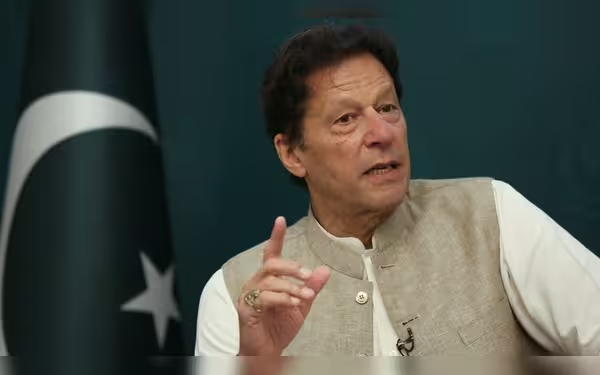Saturday, November 16, 2024 09:39 PM
Imran Khan Threatens Legal Action Against NAB Chief and Intelligence Officer
- Imran Khan warns of legal action against NAB and intelligence officer.
- Khan claims intimidation tactics are undermining his credibility.
- Political tensions rise as Khan's supporters rally behind him.
 Image Credits: tribune.com.pk
Image Credits: tribune.com.pkImran Khan threatens legal action against NAB chief and intelligence officer amid rising political tensions in Pakistan.
In a dramatic turn of events, former Prime Minister Imran Khan has issued a stern warning to the head of the National Accountability Bureau (NAB) and an intelligence officer, Mohsin Haroon. This warning comes amidst ongoing legal challenges that Khan is facing. He has made it clear that once he is released from his current situation, he intends to pursue legal action against both individuals.
Imran Khan's statement, "Once I'm out, I won't spare you or the NAB chairman," reflects his determination to fight back against what he perceives as intimidation tactics being used against him. He believes that the ongoing trial of former intelligence officer General Faiz Hameed is part of a broader strategy to undermine his position and credibility. Khan's comments have sparked discussions across the political landscape, highlighting the tensions between him and the current government.
The former Prime Minister's legal threats come at a time when political tensions in Pakistan are running high. Many supporters of Khan view his situation as a politically motivated attack, while his opponents argue that he must face the consequences of his actions. This situation raises important questions about the role of accountability in politics and the extent to which political figures can be held responsible for their actions.
As the situation unfolds, it is crucial for citizens to stay informed about the developments in this case. The implications of Khan's threats could have far-reaching effects on Pakistan's political landscape. Whether or not he follows through with his legal actions, the discourse surrounding accountability and justice in the country will likely continue to evolve.
Imran Khan's declaration of legal action against the NAB chief and Mohsin Haroon underscores the ongoing struggle for power and accountability in Pakistan. As citizens, it is essential to engage with these issues critically, understanding that the outcomes of such high-profile cases can shape the future of governance and justice in the nation.













